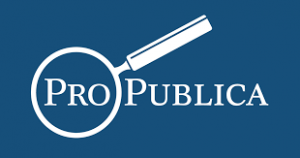
By Marshall Allen
ProPublica/ NPR (7/17/18)
To an outsider, the fancy booths at last month’s health insurance industry gathering in San Diego aren’t very compelling. A handful of companies pitching “lifestyle” data and salespeople touting jargony phrases like “social determinants of health.”
But dig deeper and the implications of what they’re selling might give many patients pause: A future in which everything you do — the things you buy, the food you eat, the time you spend watching TV — may help determine how much you pay for health insurance.
With little public scrutiny, the health insurance industry has joined forces with data brokers to vacuum up personal details about hundreds of millions of Americans, including, odds are, many readers of this story. The companies are tracking your race, education level, TV habits, marital status, net worth. They’re collecting what you post on social media, whether you’re behind on your bills, what you order online. Then they feed this information into complicated computer algorithms that spit out predictions about how much your health care could cost them.
Electronic medical records now make it easy for insurers to analyze massive amounts of information and combine it with the personal details scooped up by data brokers.
Are you a woman who recently changed your name? You could be newly married and have a pricey pregnancy pending. Or maybe you’re stressed and anxious from a recent divorce. That, too, the computer models predict, may run up your medical bills.
Are you a woman who’s purchased plus-size clothing? You’re considered at risk of depression. Mental health care can be expensive.
Low-income and a minority? That means, the data brokers say, you are more likely to live in a dilapidated and dangerous neighborhood, increasing your health risks.
“We sit on oceans of data,” said Eric McCulley, director of strategic solutions for LexisNexis Risk Solutions, during a conversation at the data firm’s booth. And he isn’t apologetic about using it. “The fact is, our data is in the public domain,” he said. “We didn’t put it out there.”
Insurers contend they use the information to spot health issues in their clients — and flag them so they get services they need. And companies like LexisNexis say the data shouldn’t be used to set prices. But as a research scientist from one company told me: “I can’t say it hasn’t happened.”
At a time when every week brings a new privacy scandal and worries abound about the misuse of personal information, patient advocates and privacy scholars say the insurance industry’s data gathering runs counter to its touted, and federally required, allegiance to patients’ medical privacy. The Health Insurance Portability and Accountability Act, or HIPAA, only protects medical information.
Privacy in crisis
“We have a health privacy machine that’s in crisis,” said Frank Pasquale, a professor at the University of Maryland Carey School of Law who specializes in issues related to machine learning and algorithms. “We have a law that only covers one source of health information. They are rapidly developing another source.”
Patient advocates warn that using unverified, error-prone “lifestyle” data to make medical assumptions could lead insurers to improperly price plans — for instance raising rates based on false information — or discriminate against anyone tagged as high cost. And, they say, the use of the data raises thorny questions that should be debated publicly, such as: Should a person’s rates be raised because algorithms say they are more likely to run up medical bills? Such questions would be moot in Europe, where a strict law took effect in May that bans trading in personal data.
This year, ProPublica and NPR are investigating the various tactics the health insurance industry uses to maximize its profits. Understanding these strategies is important because patients — through taxes, cash payments and insurance premiums — are the ones funding the entire health care system. Yet the industry’s bewildering web of strategies and inside deals often have little to do with patients’ needs. As the series’ first story showed, contrary to popular belief, lower bills aren’t health insurers’ top priority.
Chocolate-covered strawberries
Inside the San Diego Convention Center last month, there were few qualms about the way insurance companies were mining Americans’ lives for information — or what they planned to do with the data.
The sprawling convention center was a balmy draw for one of America’s Health Insurance Plans’ marquee gatherings. Insurance executives and managers wandered through the exhibit hall, sampling chocolate-covered strawberries, champagne and other delectables designed to encourage deal-making.
Up front, the prime real estate belonged to the big guns in health data: The booths of Optum, IBM Watson Health and LexisNexis stretched toward the ceiling, with flat screen monitors and some comfy seating. (NPR collaborates with IBM Watson Health on national polls about consumer health topics.)
To understand the scope of what they were offering, consider Optum. The company, owned by the massive UnitedHealth Group, has collected the medical diagnoses, tests, prescriptions, costs and socioeconomic data of 150 million Americans going back to 1993, according to its marketing materials. …

